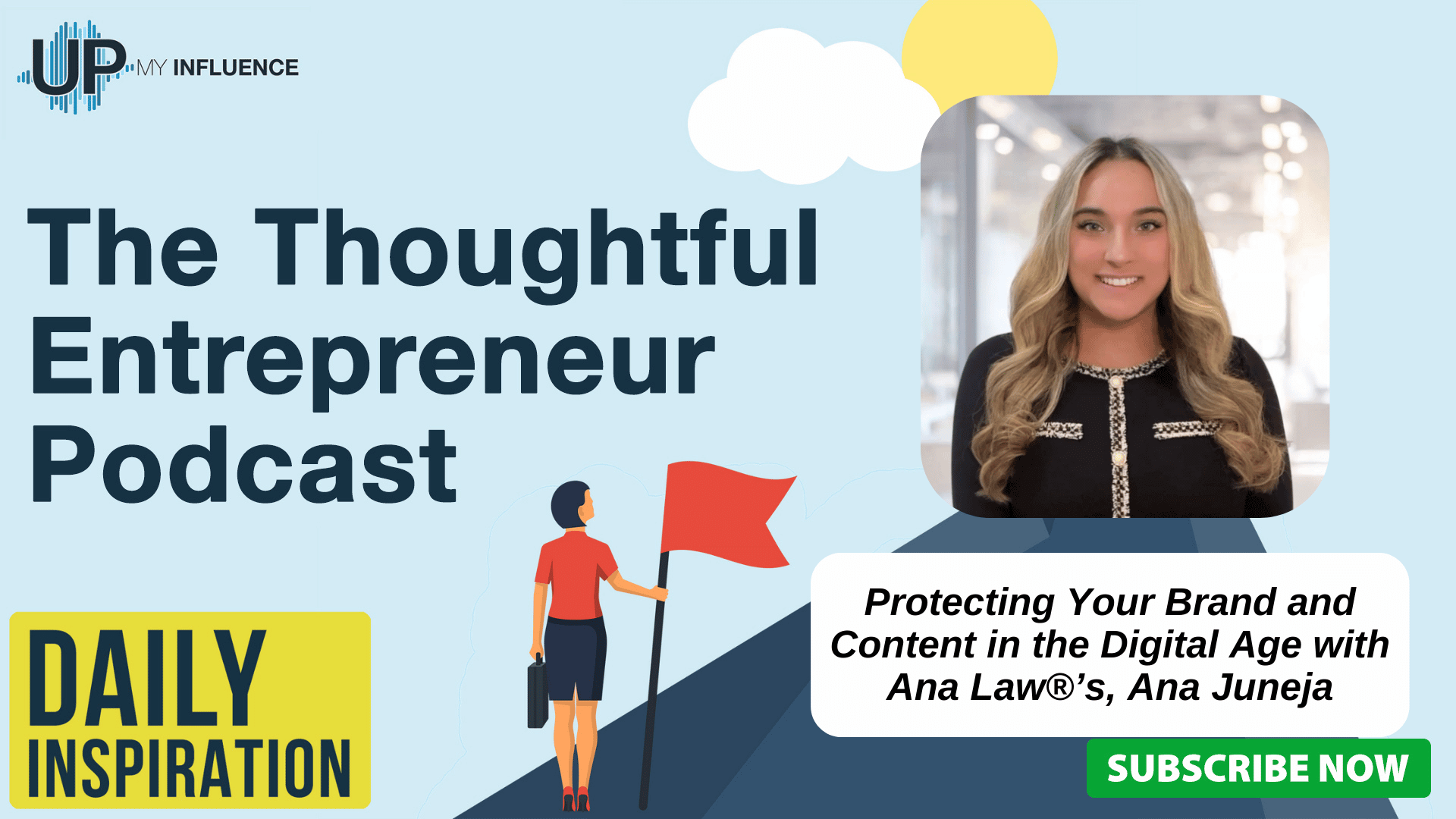THE THOUGHTFUL ENTREPRENEUR PODCAST
 Protecting Your Brand: Essential Intellectual Property Insights for Influencers and Entrepreneurs
Protecting Your Brand: Essential Intellectual Property Insights for Influencers and Entrepreneurs
In a recent episode of The Thoughtful Entrepreneur Show, host Josh Elledge sat down with Ana Juneja, an intellectual property attorney and the founder of Ana Law®. The discussion provided a wealth of information on the importance of intellectual property (IP) protection for influencers, entrepreneurs, and businesses of all sizes. This blog post will break down the key points from their conversation, offering actionable advice and detailed insights to help you safeguard your brand and navigate the complex world of IP law.
Ana Juneja specializes in intellectual property law, which encompasses patents, trademarks, and copyrights. Patents protect inventions and processes, granting the inventor exclusive rights to use and commercialize their creation for a certain period. Trademarks protect brand names, logos, and slogans that distinguish goods or services in the marketplace. Copyrights protect original works of authorship, such as books, music, and art, giving the creator exclusive rights to use and distribute their work. One of the most critical points Ana emphasized is the importance of trademark protection for influencers and celebrities. Your name and brand are your identity in the marketplace, and without trademark protection, you risk losing control over how your brand is used.
Ana stressed the importance of timing when it comes to setting up legal structures and obtaining IP protection. Establish the right legal structure for your business early on, whether it’s an LLC, corporation, or another entity. File for trademark protection as soon as you have a distinctive name or logo to prevent others from using your brand and give you legal standing in case of disputes. If you have an invention or unique process, file for a patent as soon as possible. While copyrights are automatically granted upon creation of a work, registering your copyright can provide additional legal benefits and make it easier to enforce your rights.
About Ana Juneja:
As an award-winning intellectual property attorney and the founder of Ana Law®, Ana Juneja helps celebrities, athletes, influencers, start-ups, entrepreneurs, and corporations secure and monetize their brands and ideas in the US and abroad.
Ana Law® is the first and only law firm that offers flat-fee, 100% guaranteed patent, trademark, and copyright services. Ana has a 100% success rate and often speaks on important topics such as emerging legal issues surrounding security, AI, and social media.
Additionally, Ana has extensive experience with social media intellectual property infringement issues. Ana’s insider connections with premier media agencies allow her to have direct access to key social media platforms, such as Meta (Facebook/Instagram), TikTok, and Twitter. These essential services are an important component of the brand protection strategy for Ana’s celebrity, athlete, & influencer clients.
About Ana Law®:
Ana Law® is the first and only law firm that offers flat-fee, 100% guaranteed patent, trademark, and copyright services. Ana has a 100% success rate and often speaks on important topics such as emerging legal issues surrounding security, AI, and social media.
Across the country and around the globe, business leaders and innovators look to Ana Law as their trusted legal advisor for excellence, innovation, and superior results.
As you look for opportunities to expand and grow your business and revenue, Ana Law is here to help every step of the way. We provide actionable legal & business advice to protect your ideas, products, brands, and revenue.
Apply to be a Guest on The Thoughtful Entrepreneur: https://go.upmyinfluence.com/podcast-guest
Links Mentioned in this Episode:
Want to learn more? Check out Ana Law® website at https://analaw.com/
Check out Ana Law® on LinkedIn at https://www.linkedin.com/company/analawhq/
Check out Ana Law® on Instagram at https://www.instagram.com/analawgroup/
Check out Ana Juneja on LinkedIn at https://www.linkedin.com/in/anajuneja
Don’t forget to subscribe to The Thoughtful Entrepreneur and thank you for listening. Tune in next time!
More from UpMyInfluence:
We are actively booking guests for our The Thoughtful Entrepreneur. Schedule HERE.
Are you a 6-figure consultant? I’ve got high-level intros for you. Learn more here.
What is your #1 Lead Generation BLOCKER? Take my free quiz here.
Want to learn more about all the podcasts managed by UpMyInfluence? Opt in here.


